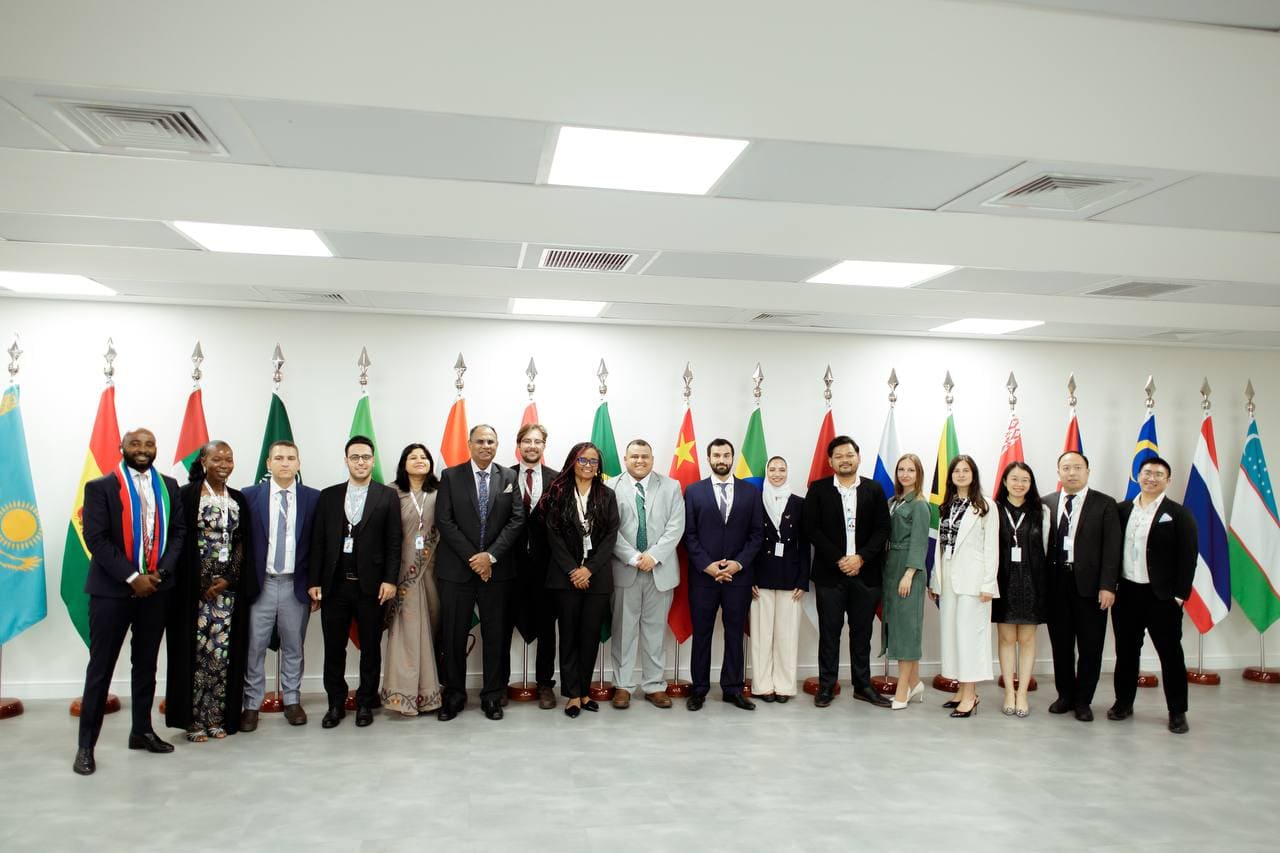
The 11th BRICS Youth Summit was held in Brasília, bringing together over 180 participants from youth organizations, relevant national agencies, and civil society across 13 BRICS+ countries, including Russia, Belarus, Brazil, Bolivia, Egypt, India, Indonesia, Iran, China, Cuba, Nigeria, the UAE, and South Africa.
Russian delegation was headed by Egor Litvinenko, Deputy Head of the Federal Agency for Youth Affairs (Rosmolodezh), and included Marat Zakirov, Deputy Chairman of the Board of the All-Russian Public-State Movement of Children and Youth «Movement of the First», Ekaterina Akopyan, Chairperson of the Council of Young Diplomats (under the Russian Foreign Ministry); Lev Zakirov, Chairman of the Chamber of Young Legislators under the Federation Council; as well as representatives from the World Youth Festival Directorate, the Project Office for International Youth Cooperation (Russia-BRICS track), and other relevant organizations.
The Russian delegation held bilateral meetings with representatives of relevant ministries and organizations from Brazil, Belarus, Bolivia, India, Indonesia, Iran, and South Africa.
Indonesian youth expressed particular interest in developing cultural and educational cooperation with Russia. During discussions with the Iranian delegation, the parties worked to finalize a draft Memorandum of Understanding between the Federal Agency for Youth Affairs (Rosmolodezh) and the Ministry of Youth and Sports of the Islamic Republic of Iran on youth policy matters. They also discussed Iranian participation in Russian projects, noting the strong representation of Iranian youth at the World Youth Festival 2024. Bolivian representatives showed special interest in participating in the World Youth Festival Assembly. Meetings with Belarusian counterparts focused on protecting historical truth, patriotic education, and projects commemorating the Victory in the Great Patriotic War. Indian representatives proposed expanding cooperation in youth parliamentary exchanges and youth mobility programs.
During the Ministerial Meeting Egor Litvinenko highlighted the strengthened role of the BRICS Youth Council as a permanent mechanism for youth policy coordination, presenting key Russian youth organizations, projects and initiatives including the “Movement of the First”, World Youth Festival, #WeAreTogether volunteer movement, patriotic centers, as well as activities of the Council of Young Diplomats under the Russian Foreign Ministry and the Chamber of Young Legislators under the Federation Council of Russia.
The event featured sessions of the BRICS Youth Council along with seven working groups: "Education, Vocational Training and Skills Development," "Youth Entrepreneurship," "Science, Technology and Innovation," "Volunteering and Community Engagement," "Development Issues, Combating Hunger and Inequality," "Ecology and Sustainable Development," and "Health and Sports."
The discussion specifically highlighted the importance of developing specialized cooperation among BRICS member states. Within the BRICS Youth Council, Federal Agency for Youth Affairs (Rosmolodezh) leads the thematic area of "Education, Vocational Training, and Skills Development.". This February, the "Russia-BRICS" Project Office in Ulyanovsk – with the Agency's support – organized the 5th "InterYes!" International Forum on Public Diplomacy, engaging over 100 young delegates (aged 14-35) from 24 countries. During the BRICS Youth Council meeting, the updated text of the Memorandum of Understanding on Youth Policy was approved, extending until 2030 the agreement originally adopted in 2015 for a 10-year period. The document establishes the main directions for developing cooperation in the fields of education, entrepreneurship, science and technology, ecology, volunteering, sports and healthy lifestyles, as well as development issues, combating hunger and inequality.
"The development of humanitarian cooperation within BRICS, including in the field of youth policy, remains a priority for the Russian Federation. The BRICS Youth Summit format has confirmed its relevance. The role of the BRICS Youth Council has significantly increased, becoming an effective tool for coordinating youth-related work. We particularly thank our Brazilian colleagues for the series of webinars 'Youth and BRICS' – this format has allowed us to hear the voices of young leaders and receive valuable initiatives. The energy of the younger generation is becoming a driver of our cooperation, ensuring continuity and an innovative approach. As the coordinator of the 'Education and Vocational Training' track, Russia will take all necessary measures to implement the provisions of the Youth Summit Declaration and the 2024 Kazan Declaration. Highly appreciating the contribution of the Brazilian presidency, we confirm our readiness to further deepen cooperation, openness to new proposals and formats of collaboration with BRICS countries," said Egor Litvinenko, Deputy Head of the Federal Agency for Youth Affairs (Rosmolodezh).
All summit participants emphasized the need to further advance youth cooperation within BRICS as a driving force of the emerging multipolar world order. Following the Summit, on June 12 (Russia Day), a thematic friendly football match was held in Brasília, co-organized by the World Youth Festival Directorate and the University of Brasília. The event’s core message was partnership over rivalry, emphasizing mutual understanding and shared goals. Representatives of the World Youth Festival Directorate noted this as one of many goodwill gestures from BRICS partners.
Presentations of the World Youth Festival Assembly were held at Brazilian universities, with approximately 200 students from leading Brazilian higher education institutions learning about the large-scale international youth event scheduled for September 17-21, 2025 in Nizhny Novgorod, which will bring together 2,000 participants from Russia and foreign countries. The presentations took place at the University of Brasília, Federal University of Rio de Janeiro, and Federal University of ABC in São Paulo state. The Russian delegation conducted a series of meetings with representatives of the education and youth sectors, including Antonio Jorge Ramalho, Director of the Institute of International Relations at the University of Brasília, and Julbernardinho Sahad, Deputy Secretary for Youth Affairs of Brazil.
Overview:
The World Youth Festival took place on March 1–7, 2024 in Sirius, according to the Decree of Russian President Vladimir Putin on the development of international youth cooperation. The WYF-2024 brought together 20,000 young leaders from 190 countries.
On the instructions of the President of the Russian Federation, the WYF will be held in Russia on a regular basis – once in six years. Also, every six years 10,000 young people from all over the world will get together at the World Youth Festival Forum, and in between, international themed assemblies for 2,000 participants will be held under the auspices of the WYF. The first Assembly is scheduled to take place in September 2025 in Nizhny Novgorod. Festival events of various formats will be held in Russia annually.
According to the instructions of the President of the Russian Federation on the preservation and development of the Festival legacy, the World Youth Festival Directorate continues the work aimed at strengthening international youth cooperation.
